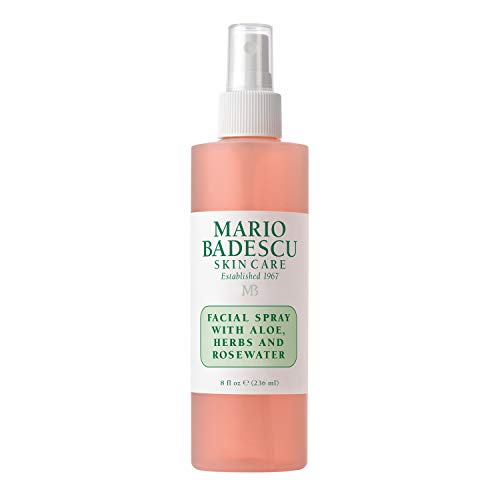Rose water is a natural astringent that has been used for centuries to treat various skin conditions. Although rose water has no antifungal activity against Malassezia, many people have found it helpful as a natural remedy for seborrheic dermatitis. Rose water can help to hydrate the skin, balance pH, reduce inflammation, and improve symptoms such as itching, flaking and redness.
Let’s take a deep dive:
What is rose water?
Rose water is made from the petals of a rose and has been used for centuries for its therapeutic properties. It’s a natural skin toner and astringent that helps to tighten pores, reduce inflammation, and improve complexion.
It is said to be beneficial for all skin types, and can be used on its own or in conjunction with other skin care products. Rose water is also a great remedy for dry skin, as it helps to retain moisture. It can be used as a facial mist or added to your skincare routine in other ways.
You can also easily make your own rose water at home by steeping dried rose petals in distilled water until they release their oil and essence into the liquid.
Skin benefits of rose water
Rose water has long been used as a natural beauty treatment. It’s a popular choice for skin care due to its many benefits. Here are some of the most notable:
- Rose water is a natural astringent. It helps to clear skin and remove impurities.
- It helps to soothe and protect skin from irritation and dryness.
- Has anti-bacterial properties that may reduce acne
- Rose water is rich in vitamins C and phenolics, making it a great natural anti-inflammatory.
- Reduce skin redness and puffiness
- Contains antioxidants to protect your skin barrier
- Helps wounds heal faster
- May have anti-aging effects and may reduce the appearance of wrinkles
- The fresh-cut rose aroma smells heavenly!
- Provides hydration to the scalp and reduces oil and dandruff
- And if you’re feeling stressed or tense, don’t worry. Rose water has been shown to relieve nervous stress and tension too.
Does rose water have anti-fungal properties?
Rose extract has been shown to have antifungal activity against Candida albicans. One study even found it more effective than ketoconazole. It also has proven antibacterial effects on common skin bacteria like Staphylococcus aureus.
However, a Korean lab study has shown that rose oil has no antifungal effect against Malassezia.
Is rose water good for seborrheic dermatitis?
Rose water is a popular natural remedy for seborrheic dermatitis. It has anti-inflammatory and antiseptic properties, which may help to relieve the symptoms of redness and itch.
Even though rose water has no anti-fungal activity, its other skin benefits (see above) make rose water a good addition to our skincare tool kit. Plus, I love the smell of rose on my face!
How do you use rose water for seborrheic dermatitis?
There are a variety of ways to make use of rose water:
Face toner
Rose water is great for reducing the appearance of pores and is popular as a toner. Pour a small amount onto a cotton ball and swipe across your face. Be sure to avoid getting it in your eyes. Leave on for a few minutes, then rinse off with cool water.
Moisturizer
There are plenty of moisturizers that are safe for seborrheic dermatitis and contain rose water.
You can also add a few drops of rose water to your regular moisturizer or foundation for extra hydration.
Face mist
To use rose water as a face mist, spray it on your face after washing it. You can also keep it in the fridge so that it’s cool when you use it.
On the scalp
You can apply it directly to the scalp and hair, or mix it with shampoo and conditioner. If you have a dry scalp, using rose water can help moisturize it and reduce dandruff and itchiness.
Side effects of rose water
Rose water is generally non-irritating, even on sensitive skin. However, like any other beauty product, rose water may have side effects. The most common are redness, dryness and skin irritation. If your skin is inflammed from an SD flare, rose water may even cause burning and stinging.
Does rose water help with dandruff?
Rose water is by no means an anti-dandruff treatment. However, it may help improve symptoms by moisturizing the scalp and removing excess sebum. This can reduce dryness and improve flaking.
You can rinse your hair with rosewater after shampooing by adding a few drops to your conditioner. You can also massage rose water into your scalp post-wash so you can leave it in for better results.
Rose water vs rose oil
Rose water and rose oil are both extracted from roses. Rose water is made by steeping rose petals in water and is therefore oil-free. Rose essential oil is rose extract diluted in a carrier oil which is often plant-based like jojoba oil.
To wrap up
Rose water is a safe and affordable option that can be used to help relieve symptoms of seborrheic dermatitis. It’s a natural and gentle alternative to conventional medications, which can often have harmful side effects.
Further reading: Is rosehip oil good for seborrheic dermatitis?
 Check it out on Amazon
Check it out on Amazon Check it out on Amazon
Check it out on Amazon Check it out on Amazon
Check it out on Amazon Check it out on Amazon
Check it out on Amazon Check it out on Amazon
Check it out on Amazon Check it out on Amazon
Check it out on Amazon
Pingback: Is rosehip oil good for seborrheic dermatitis?
Pingback: Is geranium oil good for seborrheic dermatitis?
Pingback: seborrheic dermatitis treatment